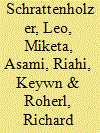| Srl | Item |
| 1 |
ID:
062182


|
|
|
|
|
| Publication |
Cheltenham, Edward Elgar, 2004.
|
| Description |
x, 219p.
|
| Series |
ERSI studies series on the environment
|
| Standard Number |
1843769239
|
|
|
|
|
|
|
|
|
|
|
|
Copies: C:1/I:0,R:0,Q:0
Circulation
| Accession# | Call# | Current Location | Status | Policy | Location |
| 049668 | 333.79/SCH 049668 | Main | On Shelf | General | |
|
|
|
|
| 2 |
ID:
052293


|
|
|
|
|
| Publication |
Oct 2004.
|
| Summary/Abstract |
This paper presents the results of using a stylized optimization model of the global electricity supply system to analyze the optimal research and development (R&D) support for an energy technology. The model takes into account the dynamics of technological progress as described by a so-called two-factor learning curve (2FLC). The two factors are cumulative experience ("learning by doing") and accumulated knowledge ("learning by searching"); the formulation is a straightforward expansion of conventional one-factor learning curves, in which only cumulative experience is included as a factor, which aggregates the effects of accumulated knowledge and cumulative experience, among others. The responsiveness of technological progress to the two factors is quantified using learning parameters, which are estimated using empirical data. Sensitivities of the model results to the parameters are also tested. The model results also address the effect of competition between technologies and of CO2 constraints. The results are mainly methodological; one of the most interesting is that, at least up to a point, competition between technologies-in terms of both market share and R&D support-need not lead to "lock-in" or "crowding-out".
|
|
|
|
|
|
|
|
|
|
|
|
|
|
|
|